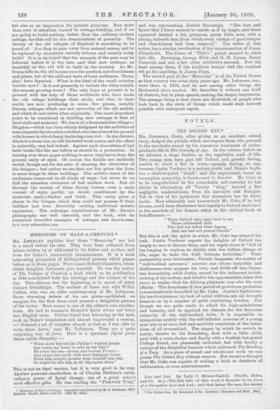MEMORIES OF HALF-A-CENTURY.*
Mn. LEHaitaix explains that these "Memories" are but to a small extent his own. They have been collected from letters written by or addressed to his father and mother, and from the father's manuscript reminiscences. It is a most interesting procession of distinguished persons which passes before us in these pages. First comes Robert Chambers, whose eldest daughter Lehmann p4e married. He was the author of The Veetigee of Creation, a book which on its publication in 1844 scandalised both the theology and the science of the
day. This alliance was the beginning, so to speak, of many literary friendships. The earliest of these was with Wilkie Collins, who was an elder contemporary of Mr. Lehmann. Some charming letters of his are given—published, we
imagine, for the first time—and present a delightful picture of the writer. Here comes in one of the editor's own recollec- tions. He had to translate Horace's Quern virunt aut heroa into English verse. Collins found him labouring at the task, took up Bohn's translation and almost improvised a version, —" dictated a set of couplets almost as fast as I was able to write them down," says Mr. Lehmann. They are a quite surprising tour de force. Here is a specimen (Quid prius diem solitie rarentie) :— "What more beyond the Father's wonted praise Can touch my heart or echo in my lays ? He rules the sea—divine and human Powers— And sways the earth with ever-changing hours. From him nought greater than himself can rise, Or aught be like him in th' Olympian skies."
This is not an ideal version, but it is very good in its way. Another personal recollection is of Charles Dickens's extra- ordinary power of facial change, one of a great actor's most effective gifts. He was reading the "Pickwick Trial,"
Mentoriee of Half a Century. Compiled and Edited by E, C. Lehmann, M.P. London Smith. Elder, and Co. [10s. tki, net.]
and was representing Justice Stareleigh. "The face and figure that I knew seemed to vanish as if by magic, and there appeared instead a fat, pompous, pursy little man, with a plump, imbecile face, from which every vestige of good temper and cheerfulness had been removed." The writer of this notice has a similar recollection of his impersonation of Jonas Chuzzlewit. The Jonas of "Phiz's " pencil seemed to start into life. Browning, George Eliot and G. H. Lewes, Barry Cornwall, and not a few other celebrities succeed. Not the least among them, if the kindliest temper and the readiest wit go for anything, is James Payn.
The second part of the " Memories " is of the -United States as that country was some sixty years ago. Mr. Lehmann, son., went there in 1853, and he saw among other things the Richmond slave market. He describes it without any kind of rhetoric, but in plain speech, making the deeper impression. The strange thing is that there are thousands of people who look back to the state of things which made such horrors possible with unfeigned regret.
























































 Previous page
Previous page